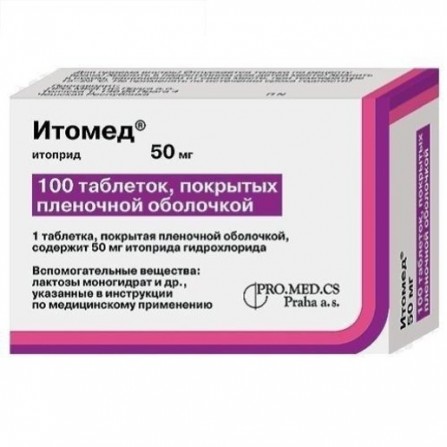Itomed pills coated 50mg N100
Condition: New product
1000 Items
Rating:
Be the first to write a review!

More info
Active ingredients
Itopride
Release form
Pills
Composition
Active ingredient: Itopride hydrochloride; Concentration of the active substance (mg): 50
Pharmacological effect
Enhances the motility of the gastrointestinal tract due to antagonism with D2-dopamine receptors and inhibition of acetylcholinesterase. It activates the release of acetylcholine, suppresses its destruction.; It has an antiemetic effect due to interaction with D2-receptors located in the trigger zone. Causes dose-dependent suppression of vomiting caused by apomorphine.; Activates propulsive motility of the stomach due to antagonism with D2-receptors, and dose-dependent inhibition of acetylcholinesterase activity.; It has a specific effect on the upper GI tract, accelerates the transit through the stomach, improves its emptying. No effect on serum concentrations of gastrin.
Pharmacokinetics
Quickly and well absorbed in the digestive tract. The relative bioavailability of the drug is 60%. Cmax in plasma - 0.28 mcg / ml, after taking 50 mg of the drug. The time to reach Cmax in plasma is about 0.5-0.75 hours. When taken again, 50–200 mg 3 times / day for 7 days, the pharmacokinetics are linear, cumulation is minimal.; Binds to plasma proteins (mainly albumin) by 96 % with alpha-1-acid glycoprotein less than 15%. Actively distributed in tissues and found in high concentrations in the kidneys, small intestine, liver, adrenal glands, stomach. Vd is. 6.1 l / kg. In therapeutic doses, slightly penetrates into the brain and spinal cord, into breast milk.; Metabolized in the liver under the action of flavin-dependent monooxygenase;; 3 metabolites have been identified, one of which shows little activity: 2-3% of the activity of itotride.; Excreted by the kidneys. T1 / 2preparation is 6 hours, in patients with trimethylaminuria T1 / 2 increases.
Indications
Symptomatic treatment of functional non-ulcer dyspepsia (chronic gastritis): flatulence; gastralgia; feeling of discomfort in the epigastric region; anorexia; heartburn; nausea; vomiting.
Contraindications
Hypersensitivity to itoprid or any auxiliary component of the drug; gastrointestinal bleeding, mechanical obstruction and gastrointestinal perforation; lactase deficiency, lactose intolerance, glucose-galactose malabsorption; pregnancy; lactation period; children's age (up to 16 years); With care: patients taking cholinesterase inhibitors and m-cholinomimetics, as well as elderly patients with reduced liver and kidney function.
Use during pregnancy and lactation
Itoprid is contraindicated in pregnancy.; When taking the drug in therapeutic doses, itprid slightly penetrates into breast milk, so you should stop taking the drug during lactation.
Dosage and administration
Inside, before meals, 1 tablet 3 times a day. The daily dose of the drug is 3 pills (150 mg). Elderly patients reduce the dose. If the drug was not taken on time, then in the future it should be taken at regular intervals. It is not recommended to take the drug in a double dose to compensate for the missed.
Side effects
From the side of blood-forming organs: leukopenia, thrombocytopenia .; On the part of the endocrine system: gynecomastia, hyperprolactinemia .; On the part of the digestive system: increased salivation, nausea, diarrhea, constipation, jaundice, pain in the epigastric region .; Of the nervous system: headache, sleep disturbance, irritability, dizziness, tremor .; Allergic reactions: urticaria, anaphylactic shock .; Laboratory indicators: increased activity of AST, ALT, GGT, alkaline phosphatase, hyperbilirubinemia.
Overdose
In case of overdose, gastric lavage and symptomatic therapy are performed.
Interaction with other drugs
Accelerates the absorption of other drugs.; The prokinetic effect of the drug does not change under the influence of means that reduce the acidity of gastric juice (cimetidine, ranitidine, teprenone, cetraxate); M-cholinoblockers decrease the effectiveness of itopride.; as well as cholinesterase inhibitors.
special instructions
If symptoms of galactorrhea and gynecomastia occur, treatment must be interrupted or completely stopped. During treatment of primary biliary cirrhosis, transient decompensation of liver cirrhosis may occur, which disappears after discontinuation of the drug. Influence on ability to drive motor vehicles and control mechanisms; driving motor vehicles and practicing potentially hazardous activities that require increased concentration, attention and quickness of psychomotor reactions


